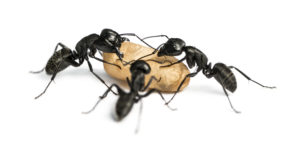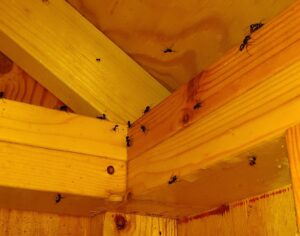Protect Your Home: Effective Carpenter Ant Control in North Georgia
Carpenter ants are a common pest in North Georgia, known for their ability to cause significant damage to wooden structures. Unlike termites, carpenter ants don’t eat wood; instead, they excavate it to create nests. Left unchecked, they can compromise the structural integrity of your home. Here’s a guide to understanding and controlling these pests to keep your property safe.
Identifying Carpenter Ants
Carpenter ants are large, usually between ¼ to ½ inch in length, and are typically black or dark brown. You might spot them indoors near windows, doors, or other entry points, especially in the spring and summer when they are most active. If you notice sawdust-like material near wooden structures, it could be a sign of carpenter ant activity.
Understanding Their Habits
Carpenter ants prefer moist, decayed wood for nesting. In North Georgia, the high humidity levels make it easy for wood to retain moisture, creating the perfect environment for these ants. They often establish satellite colonies inside homes, while the main colony might be located outdoors in tree stumps, logs, or other decayed wood.
Preventative Measures
- Eliminate Moisture: Since carpenter ants are attracted to moist wood, addressing any moisture issues is crucial. Fix leaky pipes, ensure proper drainage around your home, and keep gutters clean.
- Seal Entry Points: Inspect your home for cracks, gaps, and other potential entry points, especially around windows, doors, and the foundation. Seal these with caulk or weatherstripping to keep ants out.
- Remove Decayed Wood: Get rid of any rotting wood near your home. This includes tree stumps, old firewood, and decaying structures that could serve as a nesting site.
DIY Control Methods
- Baiting: Carpenter ants are attracted to sweet baits. Place ant bait stations in areas where you’ve seen ant activity. The ants will carry the bait back to the colony, eventually eliminating it.
- Insecticidal Dust: Apply insecticidal dust in wall voids, around foundations, and in other places where ants may be nesting. This dust can be carried back to the colony by foraging ants.
- Perimeter Treatments: Use a liquid insecticide to treat the perimeter of your home. This creates a barrier that helps prevent ants from entering.
When to Call a Professional
While DIY methods can be effective for minor infestations, a professional pest control service is recommended for severe or persistent problems. Pest control experts can identify the extent of the infestation, locate the main colony, and apply targeted treatments to eradicate the ants.
Carpenter ants can be a serious threat to your home’s structure, but with the right approach, they can be effectively managed. By keeping your home dry, sealing entry points, and taking proactive pest control measures, you can protect your property from these destructive pests. If you’re dealing with a significant infestation, don’t hesitate to call a professional pest control service to ensure your home remains safe and sound.
By staying vigilant and taking preventive steps, you can keep carpenter ants at bay and enjoy peace of mind in your North Georgia home.
As always, Canton Termite and Pest Control is happy to help you identify any pest problems and keep your home pest free! Call our office at 770-479-1598 to set up your free estimate and protect your home from invading, unwanted guests of the insect kind!
By:Tim
